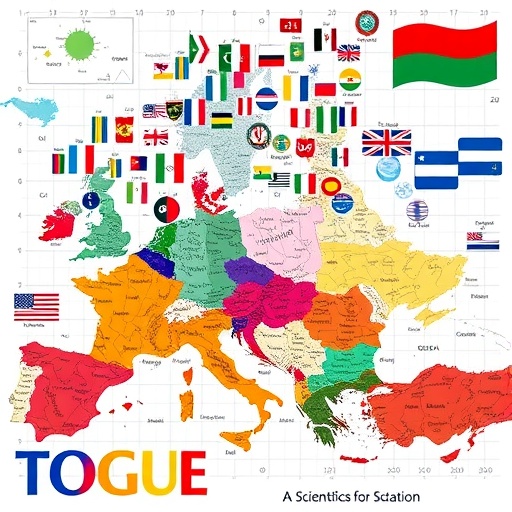In an ambitious convergence of social science and machine learning, researchers have leveraged advanced neural networks to decode the intricate tapestry of cultural values that distinguish the world’s nations. Traditional approaches to understanding cultural differences have long relied on theoretical models, often grounded in broad assumptions or limited by subjective interpretation. However, a groundbreaking study published in PNAS Nexus introduces a data-driven, theory-agnostic methodology, employing machine learning to systematically unveil the cultural attributes that best discriminate between countries on a global scale.
The study, led by Abhishek Sheetal and colleagues, taps into the extensive World Values Survey—a comprehensive dataset encapsulating millions of responses about individual beliefs, values, and attitudes across 98 countries. This repository spans multifaceted dimensions from religious convictions to political opinions, environmental concerns, and interpersonal values. Through training a sophisticated neural network model, the researchers sought to predict an individual’s country of origin solely based on their survey responses, circumventing preconceived social science theories regarding cultural determinants.
Remarkably, the algorithm achieved a striking 90% accuracy rate in correctly classifying respondents’ nationalities, a feat that highlights the rich cultural signal encoded within personal value systems. By sifting through nearly 600 survey questions, the team identified the 60 most influential items shaping the model’s predictive power. This set not only reinforced established theories surrounding political attitudes and familial relations but also unveiled lesser-explored cultural facets, such as the pivotal role of perceptions about government responsibility and the importance of political consensus within marriage.
One of the most salient predictors was the question assessing the perceived importance of maintaining social order as a governmental responsibility. This finding suggests that notions of governance and rule of law vary significantly across cultures and bear potent influence on national identity. Closely following was the question examining the priority spouses place on political agreement within marriage, a dimension intertwining interpersonal relationships with sociopolitical alignments—an area often overlooked in conventional cultural frameworks.
The prominence of these themes offers an intriguing reevaluation of cultural theory, emphasizing the confluence of political-social governance and intimate personal dynamics as critical axes of cultural differentiation. Additionally, recurring patterns emerged regarding environmental attitudes, with respondents’ views on ecological preservation informing culturally-specific behavioral tendencies. This is timely given the global urgency surrounding environmental action and the variances in collective response to climate challenges.
Further, the research explored attitudes towards gender roles and family structure—domains traditionally underrepresented or oversimplified in social sciences—revealing their nuanced importance within distinct national cultures. This highlights machine learning’s capacity to uncover hidden layers of cultural complexity that may escape hypothesis-driven investigations. The intricate interplay of these values furnishes a refined cultural map, offering unprecedented granularity.
Case studies within the research also contextualized these findings through contemporary phenomena such as cultural differences in environmental behaviors and social distancing measures during the COVID-19 pandemic. These practical applications underscore the utility of machine learning-driven cultural inventories in understanding and predicting how societies respond to crises—information vital to policymakers, international organizations, and businesses navigating a fractured global landscape.
Beyond empirical insights, this study serves as a pioneering example of how artificial intelligence can augment social sciences, transcending traditional methodologies by providing a fresh lens through which to analyze human culture. The authors envision these models as complementary tools, not replacements, integrating seamlessly with existing theoretical frameworks to enrich our comprehension of cultural dynamics.
Moreover, the efficacy of neural networks in isolating pivotal values from vast, noisy datasets points to promising potential for broader applications. From international marketing strategies to cross-cultural negotiations and global governance, nuanced cultural diagnostics derived through machine learning herald a new era in social science research and practice.
This innovation is particularly relevant as globalization intensifies the interactions between disparate cultures. Accurate, data-grounded cultural profiles can facilitate empathy, reduce miscommunication, and foster cooperation among nations with divergent values. By quantifying cultural differences with unprecedented precision, the findings empower researchers and practitioners alike to tailor approaches cognizant of underlying value structures.
In conclusion, the integration of machine learning into cultural studies not only substantiates longstanding theories but also spotlights previously underestimated dimensions of culture. As we deepen our understanding of what truly differentiates societies, these insights carry profound implications for addressing global challenges in a culturally resonant manner. The machine learning-based cultural values inventory crafted by Sheetal and colleagues stands as a transformative milestone, heralding a future where data-driven cultural analysis complements and invigorates social science inquiry.
Subject of Research: Cultural differentiation and values identification across countries using machine learning.
Article Title: What values best distinguish the world’s cultures? The machine learning-based cultural values inventory.
News Publication Date: 26-Aug-2025.
Image Credits: Sheetal et al.
Keywords: Anthropology, Social Sciences.




